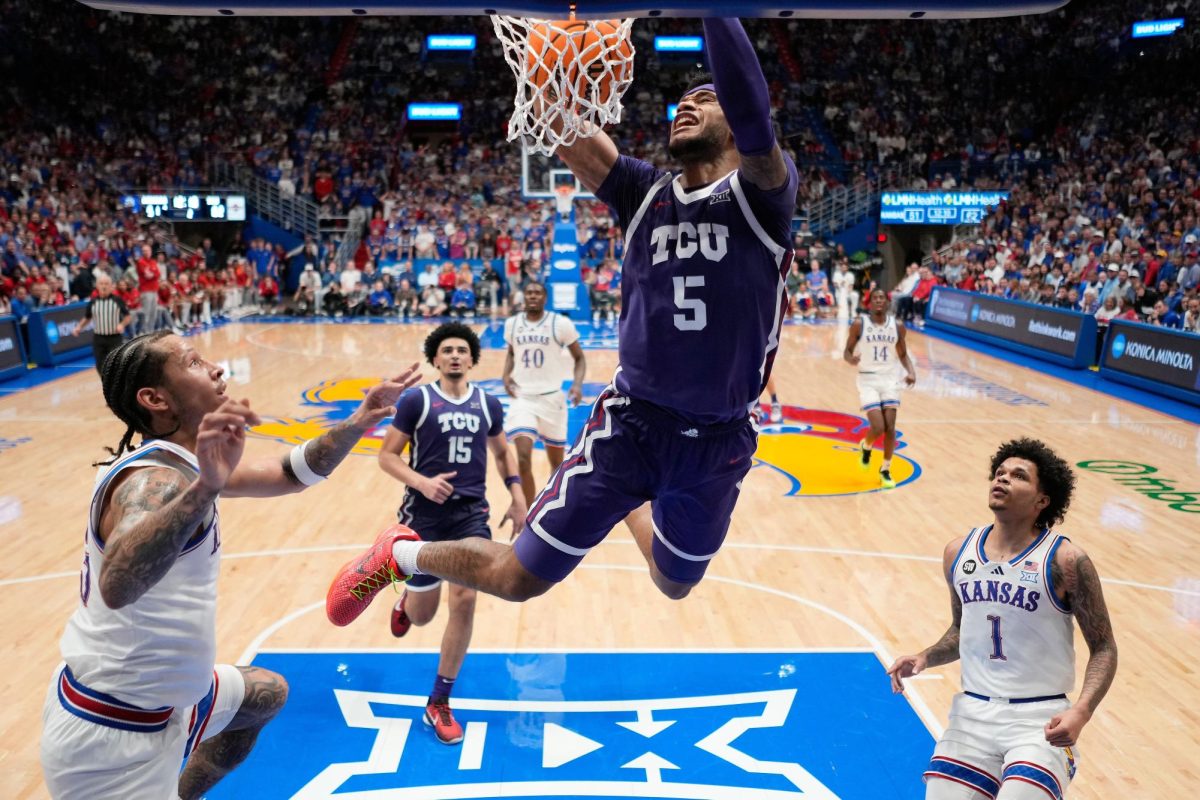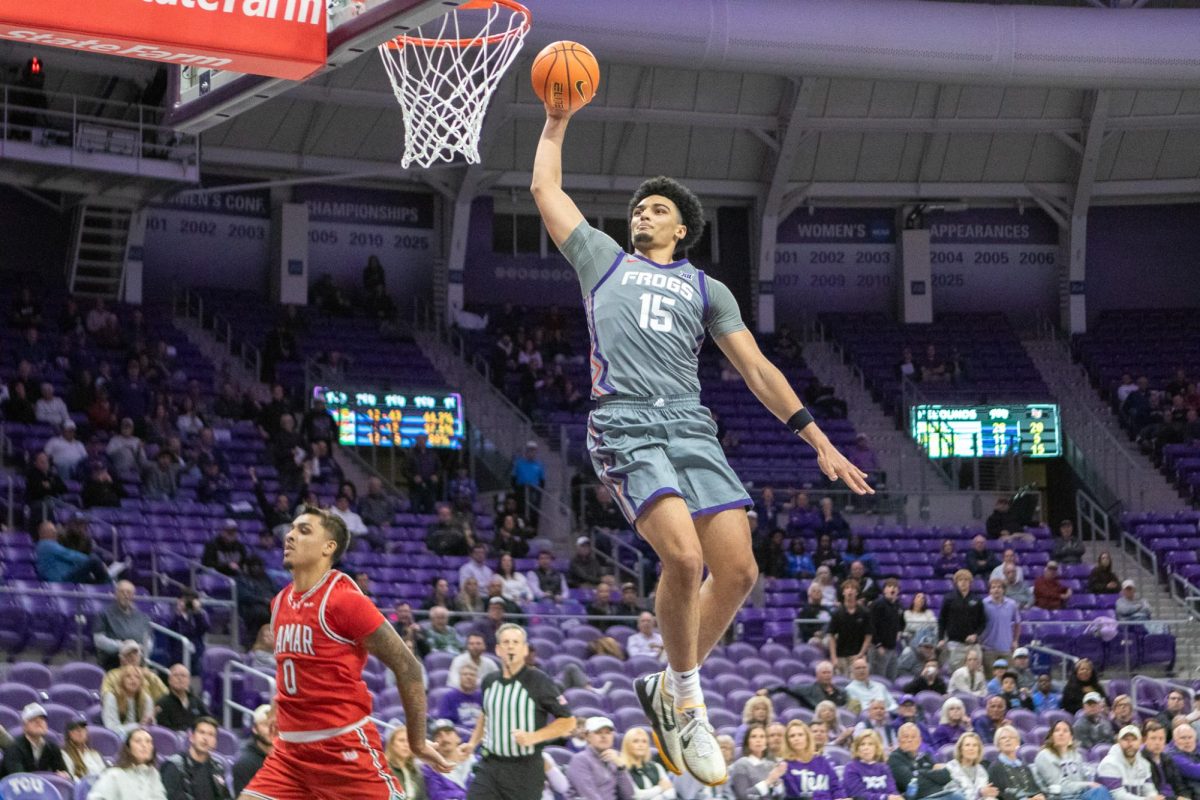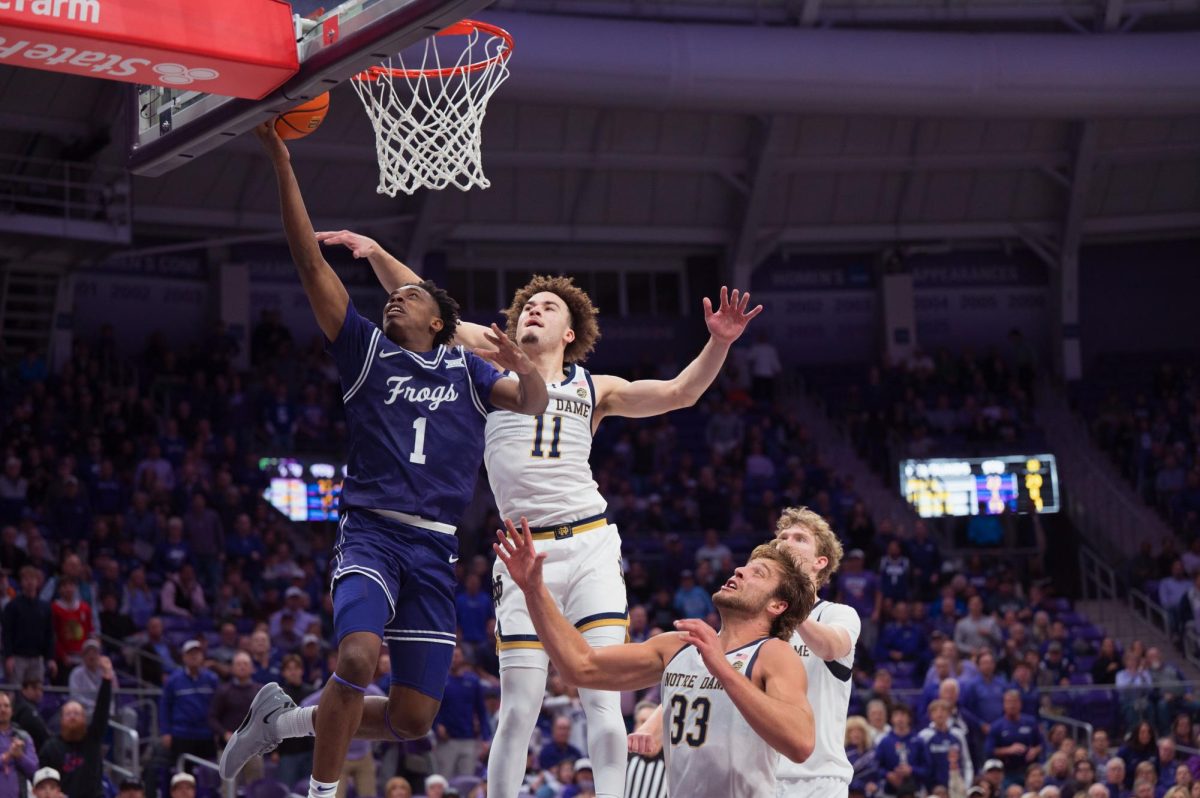Trent Johnson sat on a purple-cushioned folding chair along the sidelines of a quiet Daniel-Meyer Coliseum, pointing at the court that is his “favorite part” of his new home.
“My whole life is built off of this gym,” TCU’s new men’s basketball head coach said. “There’s nothing that excites me more than being here.”
Johnson’s coaching career started in 1980 at Boise High School in Boise, Idaho. He worked there as an assistant coach until 1985.
“I just knew for me, whether it was some level, I was gonna be involved in basketball, coaching, involved in sports,” he said. “It’s all I’ve ever known.”
But before Johnson stepped on the court in a suit and tie, he left his mark at a different Boise school by grabbing rebounds and scoring points.
Johnson earned all-time top 10 rankings in rebounding and scoring at Boise State University, where he played from 1974-78. The Broncos were the Big Sky Conference champions Johnson's sophomore year, and advanced to the NCAA Division I Championship tournament.
The former Bronco’s performance left a lasting impression on one of his current TCU colleagues. Men’s golf head coach Bill Montigel played for BSU’s Big Sky Conference opponent Idaho State from 1972-76 and remembers preparing specifically for Johnson.
ISU head coach Jim Killingsworth focused his entire game plan around stopping Johnson, Montigel said.
“He was the toughest, [most] hard-nosed rebounding guy you’ve ever seen in your life,” he said. “I’ve got all the respect in the world for him because I thought he was an incredible player.”
Johnson said being brought up by a “very competitive” mother helped shape his drive as a player.
“Some people say you’re born with it, but I just know I like competing,” Johnson said.
After spending time in Boise as a player and coach, Johnson began his collegiate coaching career as an assistant at Utah in 1986. He then worked as an assistant at Washington, Rice and Stanford.
He got his first head coaching job in 1999 at the University of Nevada. The Wolf Pack’s overall winning percentage increased from .310 to .735 in five seasons and, in 2004, they advanced to the Sweet 16 at the NCAA Tournament.
Johnson returned to Stanford in 2004 and led the Cardinal to the NCAA Tournament three of the four years he was there. During his tenure, he also coached current NBA players Brook and Robin Lopez, who now play for the Brooklyn Nets and the New Orleans Hornets, respectively.
In 2008, Johnson moved on to the head coaching position at LSU and led the Tigers to the second round of the NCAA tournament. Last year, the Tigers played in the National Invitation Tournament.
Two of Johnson’s former players, Donny Guerinoni (Nevada) and Brent Scott (Rice), joined Johnson’s coaching staff at LSU and have now followed him to TCU.
Scott said he played post at Rice from 1989-93 where Johnson was his position coach for one year.
Johnson cares about players beyond what they do on the court and maintains the relationships he forms with them, Scott said.
During Scott’s basketball career, which included 14 years of professional play in the United States and overseas, he said he stayed in contact with Johnson. When Scott’s playing career was nearing an end, he ran into Johnson at a Nike camp in Indianapolis. Johnson told Scott that if a coaching spot opened up, it would be offered to Scott.
Scott contacted Johnson before taking a coaching position at Rice for the 2007-08 season, but Johnson had nothing open at that time. But the next year, Johnson called Scott to offer him an assistant coaching position at LSU.
“The biggest thing is he’s loyal, he cares about his guys and you always know where you stand with him,” Scott said.
At TCU, Johnson and his coaching staff take over a program that has not reached the NCAA Tournament since 1998, when they lost in the first round to Florida State.
Junior forward Amric Fields said Johnson brings a “winning mentality” to the Frogs, as evidenced by his success at previous coaching stops.
Practices have focused on the defensive side of the ball, emphasizing staying in a defensive stance and being aware of what is happening, Fields said.
The first word Fields used to describe Johnson’s practices was “intense”.
“You can’t relax without him looking down your shoulder or yelling at you and stuff like that,” Fields said. “He always keeps you going.”
Johnson said he has a responsibility to help each athlete become the best player, student and person possible.
“My intensity, it’s part of who I am, but I like to think about more my responsibility as it relates to them,” he said. “I need to do whatever I can to make sure that they’re prepared.”
Before stepping into the head coaching position at TCU, Johnson said, the only game he watched was the Frogs’ win over Houston. The Tigers were scheduled to play Houston next.
The new coaching staff is focused on implementing things that have worked for them in the past rather than evaluating what the previous coaching staff did, Johnson said.
Montigel, whose son, Thomas, plays for TCU, said Johnson has done an “incredible” job at his past stops and the Frogs are lucky to have him.
The university needs to be patient because it will take time for Johnson to build up the program, but Johnson is the “perfect guy” for the job, Montigel said.
Back in the DMC, Johnson continues to talk about how central basketball is to his life, recalling his time in California.
When Johnson was preparing to leave the head coaching job at Stanford to take over at LSU, a man asked Johnson’s wife what life was like outside of basketball.
“She looked at the guy like he was crazy,” Johnson said.
They never went to places like San Francisco or Carmel unless it was for work, he said.
“Think about it,” Johnson said. “They pay me to do this. It’s unbelievable. I’ve never lost sight of that.”




